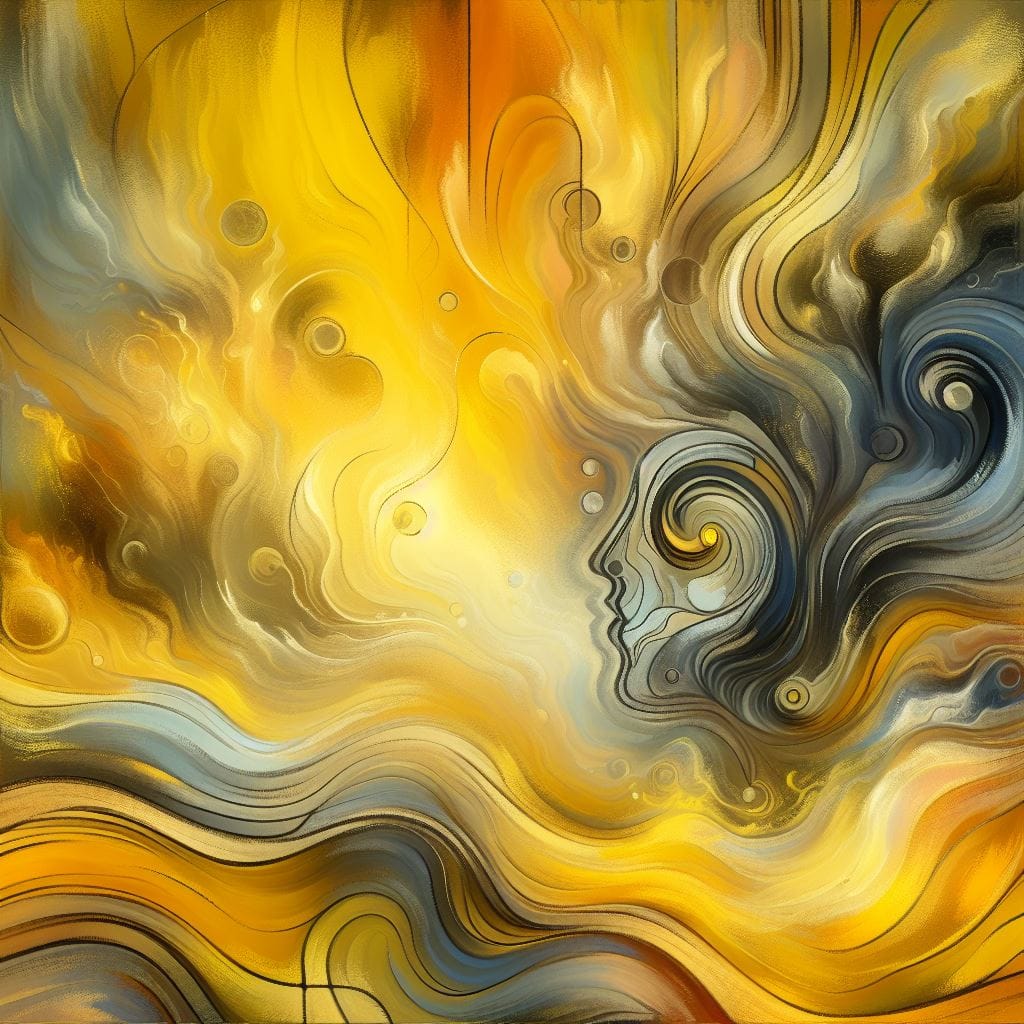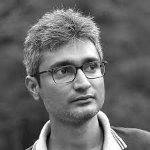TRANSLATED FROM THE BENGALI BY NANDINI GUPTA

Part II
Giyas Ali is unable to sleep that night. He keeps peeping out of his door to look for the man. But he is never again on his porch. He wonders if he should go out to look for him. He goes down a couple of steps from the porch and looks around. A gentle breeze rustles through the trees. To him, the rustling sounds like trees whispering to one another in an unknown tongue. Whispering, or conniving? Giyas Ali is alarmed. His steps falter. He climbs back onto the porch.
His fear abates a little at dawn. He gingerly walks around the house looking for the man. But he does not find him. Finally, when he steps onto the road, he sees Kalam Molla hurrying to find Jaheer Master. Giyas Ali asks, “What is it?”
Kalam Molla says, “That man who was on your porch yesterday, is juggling balls by our pond since last night. He does not react to anything we say.”
Giyas Ali reassures him, “They are like that. They don’t hear us. But that is no cause for worry. They only juggle balls. At nightfall, they go somewhere else.”
“Still, I better go and speak to Master. I should inform him.” Kalam Molla continues towards Jaheer Master’s home. Giyas Ali, on the contrary, arrives at Kalam Molla’s pond.
A large crowd is assembled there. Everyone stares at the man in green shirt and on stilts, juggling balls. Beside the green Sabeda tree, the man in a shirt as green as the tree does not look out of place anymore to Giyas Ali. He suddenly remembers how he had juggled a sabeda fruit when he had seen Yasmin run by the side of the pond, with the sound of hoofbeats. He looks for Yasmin again in the crowd, but cannot find her. Instead, he sees the cow sauntering towards the man.
At dusk, there is a meeting on Jamal Ostagar’s porch. Jahir Master is at the centre. He sits on a high stool in the middle of the crowd, smiling. It is obvious that inside he is preparing himself, before starting to speak. Jamal Ostagar, and pretty much everyone, waits earnestly for him to speak. But everyone is quiet. A fly whirrs around the crowd before flying away. Nobody pays it any attention. Finally, the master clears his throat. Giyas Ali does not breathe. Master begins, “The men on stilts wandering around our village juggling balls have no intention of stealing from or robbing us. There have been no untoward incidents so far. Clearly, they are not here to cause us harm. Rather, it is fair to assume that they are here to help us in some way. But to provide help, they need to be able to speak to us. But they appear not to hear us. It seems like they do not even know what language we speak. They are a riddle, a conundrum. So, I keep pondering the same questions, over and over. “Why did they come? Who sent them?” Master finishes talking and looks at them. Everyone is impatient for an answer. Jamal Ostagar is impatient for Master to proceed. Jamal Ostagar has brought him a cup of tea. The tea has tuned cold by now. Master gulps it down and starts again, “But they do not speak to us. We have no way of asking them questions. So, this is my plan. Each of you will tell me what you have seen of them, and I will write it all down.”
One by one they then recount to the master when and where they saw the men. Master takes down everything in detail.
When Master is done, the meeting breaks up. Every person present at the meeting has spoken, and has been carefully listened to, by a person of the Master’s stature. Everyone is happy. Giyas Ali too is happy on his way back home. But when he reaches home, he finds the cow blocking his entry. He attempts to shoo her away— “Hrr hrrr..!”.
That makes the cow laugh.
Giyas Ali asks, “What?”
The cow says, “Only if you shut your earthly eye
All the hidden secrets will you spy.”
.
Giyas Ali is flustered. “What do you mean? What are you trying to tell me?”
Saying no more, the cow trots off, flouncing her tail. Giyas Ali calls to her from behind. But the cow does not stop. He picks up a stone and throws it at her. He shouts at her. Akina Bibi comes out of the house to ask, “Why do you shout?”
Giyas Ali says, “No reason.”
But the cow’s words keep whirring inside Giyas Ali’s brain. Talking to Akina Bibi, he stops mid-sentence, but his lips continue to move. Akina Bibi says, “What are you saying?”
Giyas Ali says, “What? No, no, nothing.”
Again sometimes, when Akina Bibi is not around, he utters loudly, “If you shut your earthly eyes.” The sentence breaks up with repetition and he gets stuck with just two words: ‘close’ and ‘earthly’. At night, he wakes up with a start. Panting he thinks, “I had my eyes shut all this while, yet no secrets were revealed to me.”
Shutting eyes to the world– does that not mean sleeping then, but something entirely different? To turn your face away from this world? He begins to perspire. To turn your face away from this world—would that mean, he wonders, to depart from this world! He is overcome by the fear of death and he sees emptiness everywhere. He reaches out in the darkness for Akina Bibi. His fingers touch only the end of her sari. He shivers head to toe. He closes his eyes. Behind his shut eyes, the men, tall as buildings, in their green shirts, appear like Israel. A flock of parrots take sudden flight from under their shirts. Giyas Ali hears the flapping of their wings for a while. Then everything goes quiet. The heavy darkness enters into his stomach with every breath. He belches. The taste of his dinner floods the insides of his cheeks. The sourness of the taste abates his fear a bit. Now he works it out—everything will be revealed when you close your eyes. Nothing remains secret after death. But, with your decaying decomposing body under the grave, what is left to see? So, it cannot be death that is being referred to. Rather, it is about turning away from this world for the sake of Allah. He glances again at Akina Bibi, shadowy in the darkness. He feels deep compassion for her, and begins to laugh inside.
But in the morning, he stops laughing. After waking up, he is sunning himself on the porch when Akina Bibi says, “You have not completed your work. Aren’t you going to start the machine?”
Giyas Ali pretends not to hear.
Akina Bibi says, “How will you finish the work if you don’t even start the machine?”
Now Giyas Ali becomes angry and starts the machine at once. But his mind wanders even as he sews. He keeps remembering the cow’s words. Then he feels a sudden desire to see Yasmin. When he turns the pedals of the machine, they sound like a team of horses galloping in unison. He stops pedalling. The horses stop to recoup their strength. He steps on the pedal. The horses rear up on their forelegs and neigh. Then, they jump over the boundary wall and escape. Giyas Ali cannot keep up with the horses. He shuts down the machine and comes to Kalam Molla’s pond.
There is no one there now; it is completely deserted. Giyas Ali wanders around for a while. Then he sits down beside the pond with his feet dipped into the water. His feet shiver at the coldness of the water. Yet he does not withdraw his legs. He turns to the bamboo grove beside the pond for warmth. He expects to hear Yasmin call out to him from behind. When she does, he would at once hold out a green handkerchief to her. Yasmin would say, “What?”, and Giyas Ali would reply, “Nothing.” Giyas Ali turns to look back. He whistles like a bird. But nothing happens. Giyas Ali is surprised. He mutters to himself: “Only if you shut your earthly eye
All the hidden secrets will you spy.”
Much later he returns home to find Akina Bibi feeding Yasmin, putting milk and banana into her mouth. At the sight of Giyas Ali, Yasmin turns away to hide her face in embarrassment. Akina Bibi asks, “Is this the girl you gave the handkerchief to?” Giyas Ali nods.
Akina Bibi says, “Today, she came to me and said, Dadi, I have come. I asked her, who are you, dear. She said, you gave me a handkerchief, with two feathers in it.”
Giyas Ali says, “But there were no feathers in the handkerchief.”
Akina Bibi says, “There must have been. Else, where would the feathers come from?”
Giyas Ali says, “Do you think I am lying?”
Akina Bibi says, “I never said that.”
Giyas Ali says, “Then what are you saying?”
Yasmin interrupts, “It means that Dadi had the feathers in mind, we had not. Now I get what Dadi meant.”
Akina Bibi dissolves into peals of laughter.
Giyas Ali says, “Are you two playing with me?
Akina Bibi does not stop laughing.
Yasmin says, “Dadi, it is time for me to go. Tell him to escort me back.”
Giyas Ali looks at Akina Bibi. Akina Bibi signals her acquiescence with a lift of the eyebrows.
Yasmin rises. Giyas Ali exits the house with Yasmin. Walking with Yasmin’s hands in his, Giyas Ali again has an urge to pierce a sabeda fruit with his fingers. But not finding any, he begins to trail his fingers on Yasmin’s back. At the touch of a young skin after so long, his fingers tingle, like shoots of the sajne tree. Yasmin says, “Those tall men sauntered around our house the entire night. Seven or eight of them.” Giyas Ali is shocked.
Yasmin says, “Ah, that felt good, why did you stop?”
Giyas Ali comes to a standstill. “Go on now, on your own. I need to go back home.”
Yasmin grins and breaks into a run. Yasmin’s feet are not shod like horses. Yet when she runs, Giyas Ali again hears horse hooves.
The Maghrib Namaz ended a while ago. Jamil Ostagar’s porch is crowded with men. But Master, to hear whom speak people have gathered leaving work undone, is missing. People fidget, as they wait for him. Giyas Ali wants to speak to Kalam Molla. He secretly touches Kalam Molla’s long shirt. He fingers the cloth and thinks, “All day Yasmin moves about in front of this man’s eyes, so maybe her taste sticks to his dress.” He suddenly wishes he was Yasmin’s father, like Kalam Molla. His fingers titillate with a desire to openly pick Yasmin up in his arms and pat her to sleep. Finally, Master arrives in a van rickshaw. Everyone is surprised to see him travel such a small distance by rickshaw. Then they see a pile of books on the rickshaw. Master gets off the rickshaw and directly climbs onto the porch. He does not pay the rickshaw fare. Jamal Ostagar goes and pays off the rickshaw. The rickshaw puller brings the books up to the porch. Master points at them and says, “That’s twenty-seven books. I have written down every word you told me. All this while, I have been reading them and trying to figure things out. But now I see I made a mistake. “
Master stops. Everyone is impatient to know Master’s mistake. But Master is quiet, he does not speak. He looks around himself with expectant eyes, as though waiting for someone to ask the question. At last, Giyas Ali prods Jamal Ostagar, “Kaka, why don’t you ask?” But before Jalal Ostagar can speak, Master begins. “No, I will not tell you my mistake right away. You only need to know that I have made a course correction. You are all aware that the men wear green dresses. But what kind of green—banana-leaf green or parrot -green?”
“Parrot green,” all answer in one voice, like the children at a Makhtab.
Master asks again, “Do parrots stay at one place or fly high?”
“They fly in the sky.”
“Do the men stand still or throw balls?”
“They throw the balls up.”
“Do the balls return to their hands or fall to the ground?”
“They come back to their hands.”
Master looks at everyone again and says, “What that means is that the bird wants to fly in the sky but cannot stay up long. It flies a bit and comes back where it started.”
Jamal Ostagar asks, “So what’s your plan, Master?”
But the Master does not give Jamal a direct answer. Instead, he proposes, “The next three days I will stay away. These three days you will not try to meet me or talk to me. No cars should be allowed close to my house, or even if they do, they must make no noise. Three days later, I will meet you all here. Would you agree to this arrangement?”
Before Jamal Ostagar can speak, everyone readily agrees. This irks Jamal a bit, but Master speaks again, “Let us then call it a day.” The meeting is over, he leaves the porch. Before leaving, he requests Giyas Ali to bring those twenty-seven books to his home.
Master’s in-laws live in the next village. He sends his family away to stay with them the very next morning. Now his house is vacant, he is alone. But all the doors and windows are shut, people cannot see what he is doing inside. The villagers grow impatient. They talk about Master all day long.
Last night, the tall men in green juggled balls on Taufik Miya’s porch. Taufik Miya stayed hidden and watched them all night. Towards morning, he felt his stomach heave and went to relieve himself. When he came back, the men had disappeared. This worried Taufik Ali no end. After the Zuhr Namaz, he sits on the terrace of the Mosque peeling an orange and muses, “As long as I watched, they juggled balls. I left for a bit and they vanished. I was hiding. They should not have seen me.”
Giyas Ali said, “You mean, they had information you were watching?”
Taufik Ali gives a segment of the orange to Giyas Ali and says, “I don’t think that’s it.”
Giyas Ali threw the fruit into his mouth and says, “Then what?”
Taufiq Miya says, “When we watch, they juggle balls; when we don’t, they disappear.”
Giyas Ali eyes the half-eaten fruit in Taufiq Miya’s hand and says, “If they do not exist when we do not watch, why do they exist when we do?”
Taufiq Miya gives another segment to Giyas Ali and says, “When we do not watch they do not exist. They are there when we watch. Their existence depends on us watching them.”
Giyas Ali asks,” If their existence depends on our watching, then why do they exist?”
Taufik Ali does not share any more of the fruit with Giyas Ali. He says, “What kind of person are you?”
Giyas Ali smirks.
Kalam Molla cannot make light of it like Giyas Ali. He has a serious responsibility on his shoulders. That of ensuring that no traffic passed by Kalam Molla’s house, which fell on him by consensus at the meeting on Jamil Ostagar’s porch. So, he brings a stool to Master’s doorstep, and sits on it under the shade of the mango tree. If any car finds its way towards Masters’ home, he climbs on the stool and begins to wave a red cloth. If that does not stop the car, he jumps in front of it. When the car stops, he tells them to turn back. When the car backs away, he goes back to the stool and continues to read an old newspaper.
Giyas Ali is on his way home from the mosque. On the way, he sees Yasmin carrying her father’s meal of rice and vegetables tied in a chequered gamchha to him. Giyas Ali stops Yasmin on her way and asks, “Where are you off to, daughter?”
Yasmin says, “I am taking Abba his food.”
Giyas Ali softly caresses Yasmin’s back. The soft silky hair on Yasmin’s head has not grown very long yet. It reaches only to the back of her neck. Giyas Ali walks with Yasmin, and runs his fingers through her hair, “Does that feel good?”
Yasmin keeps quiet.
This emboldens Giyas Ali. He softly pinches the back of Yasmin’s neck; when the girl does not object even at that, he tries to bite her neck. Feeling an old man’s teeth prick the back of her neck, Yasmin cries out, “Aaah mago, dear mother!”
She pushes him away and moves ahead. Giyas Ali stares at her in bafflement. Tears have sprung from her eyes, she rubs the back of her neck and says, “You, old fogey!”
Giyas Ali asks,” But how did I hurt you?”
Yasmin says, “Fogey!”
Giyas Ali says, “But how did it hurt?” Yasmin does not answer. She picks up the gamchha with the food wrapped in it, and begins to walk very fast. Giyas Ali follows Yasmin. Yasmin says without looking back, “I will tell Abba everything.”
Giyas Ali stops in fear. When Yasmin is some distance away, he says, “But I only wanted to taste your sorrow.”
It is past nine. Kalam Molla is still seated on the stool. His arms and legs are stinging from mosquito bites. All the windows of Master’s house are still shut. Light glows through a glass pane on the window facing the south. Kalam Molla tiptoes around the house stealthily like a cat. Even when he presses his ears to the walls, he hears no sounds from inside. Seated on the stool, he dozes off for a bit. As he drifts off, he hears a cycle bell ring. He opens his eyes, but sees nobody. He thwacks at the mosquitoes with a newspaper. As he dozes off again, he hears a cycle bell again. This time, when he opens his eyes, he sees an oldish man come towards him on a bicycle. When he gets closer, he recognises Giyas Ali’s cousin, the Rickshaw-puller Bajjan.
Bajjan lights up a beedi and says, “Chachi sent me to get you.”
Kalam Molla says, “Where did you find this bicycle?”
Bajjan says, “The bicycle is Taufik Miya’s. He is at your home. He told me to get you on the cycle.” Kalm Molla wonders why Taufik Miya might be at his home at this late hour. He does not tarry. He perches on the bicycle, stool in hand and hangs the red cloth from Bajjan’s neck. With a red cloth round his neck, Bajjan charges forward on his cycle like a bull. Kalam Molla says, “You are crushing my balls.” Bajjan does not slow down. He sniggers.
When Kalam Molla enters his home, Taufik Miya says, “You were stationed outside Master’s house all this while. Did you not see them?”
“No, I did not.”
“You were there in front of master’s house all day, weren’t you?”
“Yes.”
“You were guarding his home, weren’t you?”
“Yes, I was. What’s the problem?”
“You sat there but didn’t look for them?”
“No”.
“You did not see them because you did not look for them.”
“What is all this?”
“That is exactly what I want to know.”
Irritated, Kalam Molla says, “You came here at this hour to ask me this?”
Taufiq Miya looks at Kalam Molla’s wife and grins. “Time for me to go.”
Kalam Molla says, “Of course. Were you planning to sleep here?”
Taufiq Miya scurries away.
But Kalam Molla wakes up to bad news in the morning. Rahmat Miya arrives at his house to tell him. After Kalam Molla left the previous night, some young boys burst crackers for a very long time near Master’s house. They also said nasty things about Master. Master is very peeved. He waited only till dawn to ask Rahmat to see him. Kalam Molla asked, “What did Master say?”
Rahmat Miya says, “Master has given us a warning. If things go on like this, he will not be able to find an answer. That will cause harm to us. Only Allah knows what harm he means.”
These words pain Kalam Molla. He realises that he should have been able to prevent this calamity. He mumbles, “But who were the perpetrators?
“From among us.”
“Who?”
“That we will know after Master unearths all facts.”
Kalam Molla gulps, “You are right.”
Rahmat Miya says, “I have a thought.”
“What?”
Rahmat Miya says, “Share the work, take turns. You stand guard during the day, and let the other person do so at night.”
Kalam Molla agrees, “That’s not a bad idea. But who else can I trust?”
Rahmat Miya says, “I have someone in mind.”
“Who?”
“Giyas Ali.”
Kalam Molla looks at Rahmat Miya and smirks. Rahmat Miya turns away and says,” Shall I ask him to come?”
Kalam Molla agrees.
Around twelve, when rikshaw-puller Bajjan arrives to get him, Giyas Ali is afraid that it is because Yasmin has told her father everything. That must be the reason Kalam Molla wants to see Giyas Ali. He says, “You go ahead. I will drop in sometime.”
Bajjan says, “He loaned me the cycle only so you could ride back with me. Now if I go back alone, they will be mad at me. “
Giyas Ali finds himself in a quandary. Akina Bibi says, “You are idling around the house, why not just go?” Giyas Ali cannot tell her why he is afraid. Bajjan goads him to get going. Akina brings him a tunic and says, “Put this on.”
Giyas Ali says, “I won’t go.”
Akina Bibi asks, “Why?”
Bajjan says, “If you don’t, I will be to blame.”
Giyas Ali says, “I am frightened.”
Akina Bibi asks, “Of what?”
Bajjan says, “I will go very slow.”
Giyas Ali looks at them both. Then he runs into the toilet and shuts the door. A cat lies curled up on one of the toilet steps. Bajjan bangs on the door, the cat meows.
Bajjan asks, “What is the matter with you?”
Giyas Ali does not answer. At one point, Bajjan tires of banging, and sits down in front of the toilet door. A little later Akina Bibi says, “They are here.”
Giyas Ali comes out of the toilet holding the cat in his arms. Kalam Molla asks, “You shat a cat, did you?”
Rahmat Miya looks at Akina Bibi and cackles. Embarrassed, Akina Bibi leaves them. Giyas Ali puts the cat down.
Kalam Molla asks, “Do I need to send a motor car for you? “
Rahamat Moya stops laughing and says, “Let’s talk about why we are here.”
Giyas Ali whimpers, “I am not at fault.”
Bajjan who has been quiet for so long, now leaves with the cycle. Rahmat Miya begins eloquently,
“The honour of our village is in your hands now.”
Giyas Ali says, “I am not at fault. Allah knows I have committed no sin.”
Rahmat Miya ignores his words and says, “You have to do something for us tonight.”
Giyas Ali starts up and glances from one to another.
Kalam Molla says, “You have to guard Master’s home.”
Giyas Ali sighs with relief. He says, “Oh, is that what this is about!”
Kalam Molla, says, “What, did you think we were sending you in to battle?”
Giyas Ali asks, “When do I need to go? Right now?”
Rahamat Miya says,” Bajjan will be here to pick you up at dusk.”
Once Rahmat Miya and the others have left, Akina Bibi lathers Giyas Ali’s body with soap and bathes him. Then she feeds him a bit of rice, shuts all doors and windows and sends him to sleep. After Giyas Ali falls asleep, Akina Bibi smears his sleeping body with attar and sits beside him, drinking in the scent of the perfumed oil.
When Giyas Ali wakes up towards evening, he sees his wife, having thrown all shame and caution to the wind, clasping a baby parrot to her bare chest and popping a green chilli into its mouth. Beside her, the cat waits with greedy eyes, to pounce on the bird at a moment’s lapse on Akina Bibi’s part. At the sound of Giyas Ali’s footsteps, the cat looks up and runs away.
Giyas Ali asks, “What are you doing?”
Akina Bibi covers her chest with the end of her sari and says, “Nothing really.” She lets the bird fly away and says, “Sit down.” Buy Giyas Ali doesn’t. He stares after the bird for some time. Then when he quickly looks back at Akina Bibi, he remembers the kamini tree in the graveyard. The beautiful scent of kamini flowers wafts to his nose.
At six on the dot, Bajjan arrives with a cycle. Giyas Ali comes out of the house and sees Bajjan riding the cycle and singing Muhammad Rafi’s song—”Ye duniya, ye mehfil mere kaam ki nehi, this world, this gathering is of no use to me, ye duniyaa…”
He stops singing at the sight of Giyas Ali. An oil lantern covered in red plastic hangs from the cycle. Bajjan tells him, “This is the ‘singal’. If a car arrives at night, you flash the ‘singal’ and the car will stop.”
Giyas Ali smiles.
Kalam Molla is seated on a stool below the mango tree in front of Master’s house. On seeing Giyas Ali, he gets off. He seats Giyas Ali on the stool and hands him a stick, “Take hold of this. If anybody tries any mischief, use this to scare him off.”
Giyas Ali nods and laughs to himself. Bajjan lights the lamp, turns down the flame and places it below the stool. Kalam Molla tells Bajjan, “I will not ride on your cycle. I will walk.” Bajjan laughs. Kalam Molla remonstrates, “Why do you laugh?” Bajjan shuts up.
Slowly, dusk rolls into night. No cars have arrived since Giyas Ali took charge. The people who walked by, were all familiar faces. He does not have to scare people away with his stick. He continues to sit on the stool. He glances at Master’s house and smiles. The scent of attar from his body pervades the air around him. The scent spreads like an incomprehensible sound-entombment of muffled cacophony heard from a distance. Every molecule of the pervading perfume appears to knock at the glass panes of Master’s shut windows. But before Master can discern them, they leap from one tree branch to another to join the electricity wire, and then climb down the pole to earth. A nearby blind person might be led to believe there is a kamini tree nearby. Which might further cause him to think he is in the graveyard. That would frighten him.
Giyas Ali trembles with fear. Someone whispers in his ear, “Look at the light down below.”
He knows the voice, without looking. It is the cow. He looks down. A water-snake slithers away from below his stool. He retracts his feet. The cow says again, “Scents and perfumes in secret spread, Eyes at the front show what lies ahead.”
He looks ahead and sees the men in green seated in front of Master’s house. They have dismounted from their stilts and are seated talking amongst themselves. Giyas Ali glances at the cow. The cow flaps its ears at the mosquitoes. She looks at Giyas Ali and smirks, and chews some more cud. Giyas Ali is struck by a sudden thought. He takes the lamp from beneath the stool, turns the flame up and flashes red light at the men. At the sight of the red light, the men rise immediately. They take up their stilts under their arms, and talk amongst themselves. Giyas Ali continues to wave the lantern. The men wait awhile, then disappear into the darkness at the end of the lane on which Master’s house stands. The cow says,
“Only if you shut your earthly eye,
All the hidden secrets will you spy.”
Giyas Ali says, “I get it now. To shut your earthly eye is to get away from the world. To get away from the world one needs to come only this far. This I can do any day.”
The cow does not speak anymore. She stomps on the ground twice to chase away mosquitoes. Then she lifts her tail and starts to pee. When a drop lands on Giyas Ali, he jumps off the stool and shouts,
“What’s it to anybody, eh?” The cow does not even turn to look at him. Thoughtfully she finishes peeing, and leaves.
The rest of the night passes for Giyas Ali quite happily. He is overcome with amazement at the thought that he has chased the men in green away from the village with his red signal. Looking at Master’s house enveloped in darkness, he thinks he sees a sign. When he had bit the back of Yasmin’s neck, she had tilted her head to one side and said, “You, old fossil!”. Now looking at the Master’s house, it seems everything that Master is searching for inside the house are looking at him with heads tilted to one side, as if seeing a human up close for the first time. So, they stare with their heads leaning to one side, and say from time to time, “All the hidden secrets will you spy.”
Sitting on the stool, Giyas Ali tilts his own head to one side. Just like that, he remembers the fakir he had met on the train. When he remembers the fakir, he doesn’t like to think of himself as Giyas Ali any more. At this moment he feels he inhabits another body. So, when the water snake sniffs at his feet, he hears the rustle of dry leaves. He is no longer afraid. This lack of fear alarms him. He is certain now that he is not Giyas Ali. The surroundings look unfamiliar. He raises the wick and signals to the surroundings with the red light. He thinks, now Giyas Ali is not here. Because Giyas Ali is not present here, he can stay.
At the end of the Fajr Namaz, Bajjan arrives with Kalam Molla. It’s Kalam Molla’s turn now till dusk. At dusk, Master will come to Jamal Ostagar’s porch to tell people of his findings.
The sun has just risen. Giyas Ali was awake all night. His eyes appear red in the sunlight. On seeing Kalam Molla, he rises from the stool and stands. Kalam Molla takes his place on the stool and says, “Leave the lamp at my home on your way back.” Giyas Ali answers, “Yeah!”
Bajjan presses on the cycle bell asking Giyas Ali to seat himself on the cycle. Just as Giyas Ali is about to mount, Kalam Molla asks, “Nobody bothered you last night, did they?” Giyas Ali does not divulge last night’s incident. He shakes his head from side to side and says, “No not at all.” Bajjan steps on the pedal.
Giyas Ali arrives home swinging the plastic-wrapped lamp, and stops. He does not knock. Instead, he approaches the door and chirps thrice like a parrot. When Akina Bibi opens the door, Giyas Ali sees Rahamat Miya near the door, eating milk and banana.
Akina Bibi says, “The man has now turned saint.”
“What do you mean?”
Akina Bibi says, “Last night I washed his feet and wiped them with my hair.”
Giyas Ali, looks at his wife with eyes that have been sleepless a whole night. Age has left dark patches on her skin. He dark hair is now salt and pepper, and stops in the middle of her back instead of going down to her knees as before. Akina asks, “What?”
Giyas Ali says, “You have aged.”
Akina Bibi says, “So have you.”
Giyas Ali says, “We never spared ourselves a proper glance when young, so we never realised we had grown old.”
Rahamat Miya calls from the porch, “Mother, will you give me some water?” Akina Bibi rushes in with water for him.
Giyas Ali secretly watches Rahamat Miya sitting on his haunches, as Akina Bibi holds a glass to his lips. At that sight, it seems to Giyas Ali that it is Rahamat Miya who had once inhabited his wife’s womb in the form of the unborn child.
At the thought of this old man as their child in their household of two ageing people, Giyas Ali cackles.
Master is supposed to meet everyone on Jamal Ostagar’s porch, today after the Maghrib Namaz. Accordingly, crowds begin to gather after dark. It would seem that the entire congregation at the Maghrib Namaz has descended on the porch. Many do not find a seat. Most stand. The younger men have climbed atop the asbestos roof of neighbouring houses, and now smoke beedis looking down at the porch. At Rahamat Miya’s suggestion, Jamal Ostagar convinced Mollaji to loan them the microphone from the Masjid, so that all would hear Master loud and clear. Now Master gets off Bajjan’s Rickshaw and comes to the mike. Giyas Ali with his red plastic wrapped lantern has found a place at the back of the crowd. He is a shrunken old man. He cannot see Master from behind so many people. But he can hear Master perfectly.
Master says, “In my pursuit of these men., I made a mistake. I said so earlier. Now if you want to understand my mistake, you will have to unravel a puzzle.”
Master stops and smiles at the crowd. Then he continues, “To do that, I need a few answers from you. I shall now ask you some questions. Think of the answers, but no need to tell me, keep them to yourselves.” Master stops to give people time to prepare. Jamal Ostagar brings him a glass of water. He gulps it down and begins, “When a man speaks, is it to himself that he speaks or rather so that he may be heard?”
Faced with this question, each person in the crowd mutters. Master watches, and then throws the second question, “Which means when a man speaks, he knows who is listening. Every word he utters is directed to a particular address. But when he speaks, it is only the message that is spoken out. Where is the address hidden? There is something behind every statement. It is this that carries the address. And that too must be borne by something else. Now if we keep looking for things behind every other thing, there would be no end to it. But there must be something that is at the root of everything. That which was there before, and still is. That which is there if nothing else is, and also if everything is. Now who can say what that might be?”
Rahmat Miya is standing right next to Master. He is flummoxed by Master’s words. He whispers into Master’s ears, “Master, are you talking about Allah?”
The mike is still on and everyone hears Rahmat Miya. Taufik Miya takes it forward and asks, “You mean it is Allah who is behind every statement? That Allah is behind every word we utter?”
Master does not reply. He smiles. Then someone cries out from the back of the crowd. A little later Giyas Ali can be seen running towards the porch, pushing through the crowd and waving the red plastic-wrapped lamp. He arrives panting and says, “I have a question.”
Master holds the mike out to him. Giyas Ali turns the mike round and round in his hand, takes a deep breath and says, “It is written in the book that for those destined for behest or paradise, all thoughts will become reality. When they desire grapes, grapes will appear. In that case, what is the need to speak? It is enough then to imagine grapes behind closed eyes.”
Fearing that Giyas Alis’ words might be veering into dangerous territory, Jamal Ostagar snatches the mike away. He takes it upon himself to announce, “Now Master will tell us his findings about the men in green.”
Jamal Ostagar holds out the mike to Master. Master takes it and says, “My investigations are in line with what Giyas Ali tried to say just now. Earlier, I indicated that Allah is secreted within our words. That would mean where there are no words, neither is Allah. So, if there are no words in paradise, how would Allah exist?”
At Master’s words, everyone falls silent suddenly. Jamal Ostagar furiously snatches the mike away and says, “You speak against Muslims.”
Giyas Ali attempts to snatch the microphone away from Jamal Ostagar. Immediately, Rahmat Miya slaps him smartly on the cheek. Giyas Ali breaks into tears. Master says, “But how do we know if words are spoken in Paradise? What happens there is known only to those who have attained Paradise. But if they were to tell us, they would have to resort to words.”
Hearing Master, Jamal Ostagar calms down somewhat. Rahmat Miya says, “Tell us what you had to say, master.”
Master asks, “You want to know about the men in green?”
Everyone cries out in unison, “Yes.”
Master says, “I can start with any story to tell you about them.”
Giyas Ali whimpers, “What do you mean?”
Master says, “This river that flows past our village carries my story within it.”
Taufik Miya cries out, “How do you mean?”
Master says,” There was an ancient poet in this Bangla. His name was Alawal. When young, he was sailing a boat with his father one day. A boat as green as a parrot. A red flag flew at its mast. Red as a parrot’s beak. Once firingee pirates raided the boat. They killed Alawal’s father. The harmads, pirates took Alawal captive to Rasanga (Arakan) and sold him into the king’s army. He trained as a soldier, but he continued to compose poems on horseback. The horse galloped and he recited poetry. His poetry astounded the army camp. The soldiers soon learnt a few of his poems by heart. At night, when they guarded Solomon’s special court, they walked about on stilts and recited these poems aloud.” Giyas Ali interrupts Master, “You mean the men wandering around our village are the soldiers of yore?”
Master says, “That’s your story. Listen to mine first.”
Master again begins his story. But Giyas Ali does not linger. He slowly climbs down from the porch and turns his steps homewards.
Leaving the porch behind, it is obvious to him that all the men have gathered at Ostagar’s porch, the village is deserted. Giyas Ali dangles the red lantern and glances towards the sky. The half-moon stuck to the dark sky reminds him of a scene from an ancient tale. Right then he sees a horse gazing down at him from atop the asbestos roof of Rahmat Miya’s house. He stops in his tracks. The horse leaps into the air and floats like a feather for a while. The he lands on the ground, twists his neck, raises his forelegs and gesticulates to Giyas Ali. Giyas Ali asks, “What?” The horse does not reply.
Giyas Ali takes a couple of steps towards the horse.
The horse also takes a couple of steps towards him. Giyas Ali again hears hoof beats. He murmurs,
“Yasmin, Yasmin!”
The horse nods in acquiescence.
Giyas Ali rubs the horse’s back. His fingers tire of the pleasurable feel of the wool on the horse’s back. He removes his hand. He waits awhile before turning homewards.
From some distance, he looks back at the horse who stands just as he had left him, in the middle of the narrow road, as if calling out to Giyas Ali, as if wanting to go far away with Giyas Ali riding on his back. Giyas Ali too wants to rub his hand on the horse’s back one more time. But he does not advance towards the horse. He restrains himself and keeps swinging the red lantern
The half-moon is still awake against the dark sky. All else is quiet.
Also, read the first part Giyas Ali’s Love and His Alone Time by Sadique Hossain, Translated from The Bengali by Nandini Gupta and published in The Antonym:
Follow The Antonym’s Facebook page and Instagram account for more content and exciting updates.
































0 Comments